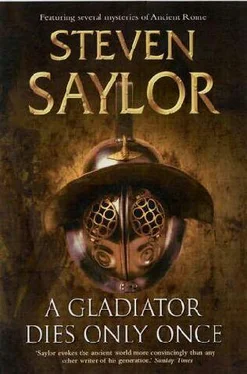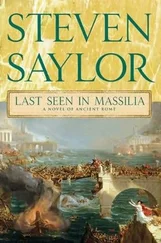Steven Saylor - A Gladiator Dies Only Once
Здесь есть возможность читать онлайн «Steven Saylor - A Gladiator Dies Only Once» весь текст электронной книги совершенно бесплатно (целиком полную версию без сокращений). В некоторых случаях можно слушать аудио, скачать через торрент в формате fb2 и присутствует краткое содержание. Жанр: Исторический детектив, на английском языке. Описание произведения, (предисловие) а так же отзывы посетителей доступны на портале библиотеки ЛибКат.
- Название:A Gladiator Dies Only Once
- Автор:
- Жанр:
- Год:неизвестен
- ISBN:нет данных
- Рейтинг книги:5 / 5. Голосов: 1
-
Избранное:Добавить в избранное
- Отзывы:
-
Ваша оценка:
- 100
- 1
- 2
- 3
- 4
- 5
A Gladiator Dies Only Once: краткое содержание, описание и аннотация
Предлагаем к чтению аннотацию, описание, краткое содержание или предисловие (зависит от того, что написал сам автор книги «A Gladiator Dies Only Once»). Если вы не нашли необходимую информацию о книге — напишите в комментариях, мы постараемся отыскать её.
A Gladiator Dies Only Once — читать онлайн бесплатно полную книгу (весь текст) целиком
Ниже представлен текст книги, разбитый по страницам. Система сохранения места последней прочитанной страницы, позволяет с удобством читать онлайн бесплатно книгу «A Gladiator Dies Only Once», без необходимости каждый раз заново искать на чём Вы остановились. Поставьте закладку, и сможете в любой момент перейти на страницу, на которой закончили чтение.
Интервал:
Закладка:
The voyage back to Rome seemed long and tedious, yet not nearly long enough; I was not looking forward to meeting with Gaius Claudius and giving him the news.
I had done exactly as he asked: I had found his grandson, delivered the letter, invited Mamercus to flee. I had accepted the task and completed it. When Sertorius asked me to find the white fawn, how could I have known the end?
None of us could have known the outcome of my trip to Spain, least of all Gaius Claudius. And yet, if Gaius had not sent me to find his grandson, Mamercus might still have been alive. Would the old man be able to bear the bitterness of it, that seeking only to bring the boy safely home, he himself had instigated the events that led to the boy's destruction?
And yet, surely Mamercus alone was responsible for his downfall. He had deceived his grandfather, no matter that he loved him; had been a spy for a man and a cause he did not care about; had murdered an innocent girl. And for what? All for money; nothing but that.
I should not waste a single tear on the boy, I told myself, leaning over the rail of the ship that carried me back to Rome. It was night. The sky was black and the moon was full, her face spread upon the dark waters like a great pool of white light. Perhaps I did shed a tear for Mamercus Claudius; but the cold breeze plucked it at once from my cheek and dropped it into the vastness of the salty sea. There it was lost in an instant, and surely never counted for anything in the scales of justice, either as reckoned by mortals or by the gods.
SOMETHING FISHY IN POMPEII
"Taste it," said Lucius Claudius. "Go on-taste it!"
I wrinkled my nose. Strange as it may sound, I was not particularly fond of garum. Never mind that ninety-nine out of a hundred Romans adore it, and add it to ninety-nine out of a hundred dishes, spooning it over everything from sausages to egg custard, from asparagus to honey cakes. "Garum goes with everything," goes the popular saying.
We sat in the garden of Lucius's opulent house on the Palatine Hill. A slave stood before me-a rather beautiful young slave, for in all things Lucius was used to having the best-holding a small silver dish in each hand. In each dish was a dark, glistening dollop of garum.
"Taste it!" insisted Lucius.
I dabbed a finger into the thick, oily sauce in the dish to my left. I smelled it first, breathing in the sharp odor of pickled fish; reluctantly,
I popped my finger into my mouth. The taste was powerful: salty and slightly tangy, the spices playing with remarkable complexity upon my tongue.
I smiled. "Actually, that's not bad. Not bad at all."
"Of course it's not bad!" said Lucius, his fair, chubby cheeks blushing as red as the curls on his head. "That's the finest garum on the market, made exclusively at my manufactory outside Pompeii. The only reason you claim not to be fond of garum, Gordianus, is because you're used to the awful stuff that's passed off as garum- smelly pots of fermented fish entrails with a few crushed olives and a sprig of rosemary thrown in for seasoning. Foul stuff! This is the real thing, made from farm-fattened sardines macerated in salt and seasoned with my own secret recipe of spices and herbs, aged for a full month before it's scooped into amphorae for shipment-not the mere twenty days that some of my competitors try to get away with."
I dabbed my finger into the garum and took another taste. "It's really quite delicious. This would be very good on meats. Or vegetables. Or you could simply eat it on a piece of flatbread. Or straight out of the jar! Yes, I could get used to eating this. I suppose it's expensive?"
"Very! But help me with my problem, Gordianus, and you shall have a lifetime supply, free of charge."
"And what would that problem be?"
"Taste the other sample."
I took a sip of wine to cleanse my palate, then dipped my finger into the dollop of garum to my right. I smelled it; popped my finger between my lips; closed my eyes to savor the heady aftertaste that suffused my entire mouth; then dipped my finger to try a second helping.
Lucius leaned toward me. "And?" "Obviously, I'm no expert on garum, but… " "Yes, yes?"
"I would say that these two samples are… identical. The same robust yet subtle taste; the same sublimely slippery texture. No difference whatsoever."
Lucius nodded gravely. "And that's the problem! The first sample you tasted is my own brand of garum. The second is from my competitor, that blasted Marcus Fabricius."
"Fabricius?"
"His little garum manufactory is just a stone's throw from my own, down in Pompeii. I ship all over the world, while Fabricius sells most of his product out of a little shop here in Rome. Every so often I purchase some his garum, just to remind myself what an inferior recipe tastes like. I bought this batch today. Imagine my shock when I tasted it!"
"It does seems unlikely that garum from different makers could be so completely identical."
"Unlikely? Impossible! Fabricius must have stolen my secret recipe!"
So it happened, for the promise of a lifetime's supply of the world's best garum-and because Lucius Claudius is my good friend and steadfast patron-that I found myself in the vicinity of Pompeii a few days later, taking a tour of Lucius's garum manufactory with the foreman, a tall, wizened slave named Acastus. I carried a letter of introduction from Lucius and posed as a would-be investor.
The impressive compound was situated beside a stream that emptied into the bay at the foot of Mount Vesuvius. Patios surrounded large sunken tanks in which the sardines were fattened; the murky water glistened with masses of darting silver fish. A warehouse held great stores of salt, herbs, and spices. Nearby there was a shed where artisans crafted clay vessels; storage pots for spices, as well as special pots for making the garum and amphorae for transporting it, were made on-site. There was a large stable full of horses and wagons for transporting the finished product overland to various Italian cities, as well as a waterfront facility for loading ships that would take the garum to markets as far away as Alexandria. Among those who could afford it, the garum of Lucius Claudius was a much sought-after, highly valuable commodity, the integrity of which he wished devoutly to safeguard.
At the center of the compound was the large, charmingly rustic house where Lucius stayed when he was in residence. Attached to the house were the guest quarters where I would be staying. The up-per story contained Acastus's office, where pigeon-hole shelves were stuffed with correspondence and tables were stacked high with ledgers. From his balcony, beyond the warehouse, I could see the glittering bay dotted with sails. Closer at hand, beyond the wooded cleft by the stream, I could see the roofs and terraces of a neighboring compound.
"What's that place?" I asked.
Acastus squinted. "Oh, that's the manufactory of Marcus Fabricius. They make garum, too, or something they call garum. Of no interest to a serious investor, I assure you. Their product is quite inferior."
"I see. Can you show me exactly how the garum is prepared?"
"What's that you say?"
I repeated my request, more loudly.
"Certainly," wheezed Acastus. He seemed so old and frail that any master but Lucius would likely have replaced him long ago; but Lucius had a kindly streak, despite his patrician snobbery. Acastus, he had assured me, was the most trustworthy of all the foremen on all his farms and manufactories (for garum was only one of Lucius's moneymaking enterprises). Acastus oversaw production, scheduled shipments, billed customers, and kept the books. At all these tasks,
Lucius told me, Acastus excelled. But a foreman must be watchdog as well as overseer; if something odd was going on at the garum manufactory, were Acastus's eyes and ears sharp enough to notice?
Читать дальшеИнтервал:
Закладка:
Похожие книги на «A Gladiator Dies Only Once»
Представляем Вашему вниманию похожие книги на «A Gladiator Dies Only Once» списком для выбора. Мы отобрали схожую по названию и смыслу литературу в надежде предоставить читателям больше вариантов отыскать новые, интересные, ещё непрочитанные произведения.
Обсуждение, отзывы о книге «A Gladiator Dies Only Once» и просто собственные мнения читателей. Оставьте ваши комментарии, напишите, что Вы думаете о произведении, его смысле или главных героях. Укажите что конкретно понравилось, а что нет, и почему Вы так считаете.










